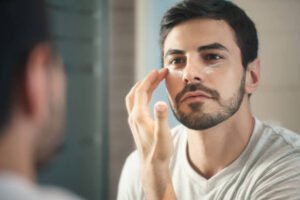They say age is just a number, but when men age, do they really not care about looks anymore? Do men lose their interest in how women look as they age? Or is there more to it than that?
What really is the answer to the question: At What Age Do Men Stop Caring About Looks? When it comes to men caring about looks and beauty, it has always been a matter of intense interest and novelty.

Does society’s ideals of beautification matter to a man? What about men themselves? Do they care about their appearance when they get older or do they stop caring about how they and their women look?
This question could hardly be more pertinent to modern society, where expectations on both men and women to adhere to a certain physical appearance seem to be ever rising.
With social media’s ever-looming presence and the seemingly unattainable standards set by celebrities, beauty remains a contested plane and one in which people often struggle to feel secure. In this context, the role of age in a man’s self-perception is more critical than ever.
One important reason to address this topic is that the process of aging can affect a man’s self-image.
As we age, our bodies undergo natural changes including wrinkling and graying of our hair, as well as a loss of muscle mass.
Men who have invested much of themselves in their appearance throughout their life can sometimes find it challenging to accept these physical changes.
Changes in appearance over time may also be affected by changes in our lives, such as starting a family or settling into a career.
In the effort to balance these priorities, grooming habits and time spent working out may decrease, for example.
Yet not all men feel this way. Many feel that age gives them the wisdom and maturity not to let societal expectations hold them hostage and that what is inside a person is much more important than what is outside the person.
They argue that in other words, as men age, they care less about looks and value traits such as intelligence, kindness, and humor.
Additionally There are biological factors at play, as well. Testosterone decreases in men as they age, studies have shown, which is often associated with decreased libido and decreased motivation to keep a chiseled body.
At What Age Do Men Stop Caring About Looks? This is an important and pertinent question for our current culture that directly ties in to mental health, societal natures, and personal development.
In this article, we’ll take a closer look at what is really going on in a man’s mind concerning his looks as he ages.
How Societal Norms and Personal Beliefs Shape Men’s Perception of Physical Appearance
Physical appearance is expected and idealized by society specifically for men.
Since the Greek and Roman times of Olympian statues ripped with muscles to the modern-day era of six-packs and sharp jawlines, men are constantly under pressure to maintain a certain standard of physical attractiveness.
However, as they age, do these societal expectations still hold the same weight? At what age do men stop caring about looks?
To answer this question, we must first understand how societal norms and individual values mapped out for oneself affect our viewpoint towards physical features.
Men are always shown images of men who are not from the real world. Men who are suave, charming and yes, glamorous.
These men we see on TV and in magazines set an unrealistic bar for average men, leaving them to feel insecure about their physical appearance but still wanting to look good.
Additionally, our society tends to idealize and place value on youth, which is associated with features like clear skin, thick hair, a healthy and fit appearance.
These features change or diminish with age in men due to a variety of biological reasons including the decrease in collagen levels produced in the skin, hair loss, or declining levels of testosterone and therefore how these disfigure their looks instead of being a part of natural aging process may play role in why they prioritize their looks.
As a result, men might feel less confident in their appearance as the ideal standard of beauty has made them perceive their falling short of expectations.
It follows that individual belief systems also play a key role when it comes to the extent to which men prioritize their looks.
For example, some men may have been raised with parents or cultures that placed high demands on appearance and grooming.
Similarly, they might have the tendency to prioritize their looks when compared to others.
Yet as some men age and enter the various stages of life, whether it is marriage or fatherhood, physical traits become less important to them.
Instead, they seek other characteristics such as intelligence, kindness, and loyalty.
This is because they learn that in order to experience true happiness, it is important to develop deeper connections and make meaningful relationships with others.
In addition, studies find that aging allows people to cultivate more self-love and self-acceptance.
As some people grow old, they tend to become more comfortable and accepting of themselves and their flaws. As a result, how they look becomes less significant.
Now, at what age do men stop caring about their looks? This can depend too much on culture, personality, and individual experiences.
Some men have an all-out pursuit of physical beauty for as long as they live. Others can reach an age where inner beauty and personality become more important or more attractive to them.
There is beauty at all ages, so age should not be a criterion. After a certain point, inner peace and confidence become the most attractive.
Read More: Love Knows No Age, But Can Age Gap Relationships Work?
Statistics on Body Image and Aging In Men
Body image is one of the most complicated, and most pervasive, concerns facing people of all genders and ages.
Although the pressure on women to conform to a narrow range of beauty standards is well-publicized, there is also a growing recognition of the impact of cultural norms on men’s bodies.
For men, however, the aging process poses unique obstacles to maintaining a youthful appearance and perhaps a youthful outlook as well.
Research has shown that as men age, they become more dissatisfied with their body, especially in the context of aging-specific change.
In a study published in the Journal of Gerontology, body image concerns were a greater source of self-esteem in men older than 60 than in younger men.
So as men age, they may become more preoccupied with their physical appearance and how they are perceived by others.
Cultural norms play a key role in this as well. Men face the same onslaught of cultural images of the fit and muscular twenty-something year old.
They are told that wrinkles and gray hair are unattractive, so they are also expected to continue looking youthful into their seventies.
In fact, research has found that middle-aged and older men are more likely to engage in body-conscious activities, such as dieting and exercising, in order to enhance their physical appearance as well.
This is because, as outlined above, middle-aged and older men believe society values beauty and attractiveness above all else, even in old age.
This is relevant because body-based concerns, as statistics show, do not diminish as men age.
Instead, more men become conscious of their physique due to new social norms and “old-age” stereotypes that society forces upon aging men.
We need to fight the attacks on aging men’s body image and body dissatisfaction by diversifying our ideals of beauty.
The Cultural Pressure to Stay Young and Attractive
Societal standards dictate that everyone be beautiful – gender regardless. With society’s fixation on youthfulness and clear skin, men too feel like they are expected to keep up appearances.
Men are also expected to have a little something that resembles muscularity, radiant skin, and well-groomed hair.
Needless to say, they should also effortlessly have a dash of masculinity. But it is not only younger men who face this pressure; older men are not exempted either from the impossible expectation to look and feel like varsity jocks.
These societal expectations tend to affect men of all generations.
Young men feel as though they are expected to look a certain way in order to stand out or attract a partner among their peers. While older men can feel as though they are losing their good looks rapidly and that they will become unattractive as a result.
The pressure to look a certain way, or as women thinks they should, is leading to many male mental health issues, including body dysmorphia and an increasing amount of pressure to undergo treatments just to be able to keep up with societal standards of beauty.
It’s time that we as a society start accepting everyone no matter what their age, shape and size may be.
The Evolution of Beauty Standards for Men
Over several millenniums, the perception of male beauty has been transformed a lot.
In ancient civilizations such as Ancient Greece and Rome, muscular bodies were considered to be appealing in men.
Along with strong bodies, symmetrical features were also admired. Painters and sculptors portrayed similar characteristics in their art, and sculptures from antiquity depict sculptures of men with chiseled bodies and squared jawlines.
In the Renaissance era however, plump figures were more preferable both for artists and the general public.
During that time period, especially in northern Europe, men with extra pounds were portrayed as wealthy and well-off, reflecting the ideals of the time.
We entered the 20th century and male beauty standards ebbed towards a more slim and youthful look.
The pretty boy style thrived, and the clean-shaven face and skinny form became the perfect canvas.
However, these days we see an increased love and adoration for all kinds of men regardless of their height, weight, skin color, or shape.
The cultural movement towards accepting everyone’s own beautiful definition has been one that has affected standards of beauty widely and has aimed to shatter the traditional standards of what is and isn’t beauty.
So we’d like to remind everyone that beauty is, truly, in the eye of the beholder.
Conclusion
The assumption that men stop caring about looks at a certain stage of their lives is not entirely true.
Their choices and behavioral patterns may change with time, but physical attractiveness still remains a priority in most relationships.
It is crucial to understand that everyone has different needs and choices and hence it is difficult to generalize at what age men stop caring about looks.
Lastly, the personal moral values and the set priorities of the individuals play a significant role in deciding what is attractive for them at other stages of their lives.
Frequently Asked Questions
At what age do men typically start to care less about physical appearance in a partner?
As people age, their priorities and values may shift, leading some men to prioritize personality traits and compatibility over looks. However, there is no specific age at which all men stop caring about physical appearance.
Do men ever truly stop caring about looks?
While preferences may change with age, physical attraction is still important for many individuals throughout their lives. Men may continue to value physical appearance to varying degrees even as they get older.
What are some factors that can influence how much importance a man places on looks?
Individual experiences, cultural influences, personal values, and relationship history can all play a role in determining how much importance a man places on physical appearance in a partner.
How can women navigate dating and relationships if they are concerned about aging and their looks?
The best thing women can do is to work on becoming more self-confident no matter what they look like, form genuine companionship with someone whose values and interests match our own, and focus on our health and other aspects of our lives, rather than our looks. Communication and respect are less about age and looks, and more about building a working partnership no matter what we look like.








3 comments
Winston here from Iowa. I’m always watching to see what newer sites are going up and I just wanted to see if you would like an extra hand with getting some targeted traffic, Create custom AI bots to answer questions from visitors on your site or walk them through a sales process, create videos/images/adcopy, remove negative listings, the list goes on. I’ll even shoulder 90% of the costs, dedicating my time and tools that I’ve created myself and bought over the years. I’ve been doing this for over 22 years, helped thousands of people and have loved every minute of it.
There’s virtually no cost on my end to do any of this for you except for my time starting at 99 a month. I don’t mean to impose; I was just curious if I could lend a hand.
Brief history, I’ve been working from home for a couple decades now and I love helping others. I’m married, have three girls and if I can provide for them by helping you and giving back by using the tools and knowledge I’ve built and learned over the years, I can’t think of a better win-win.
It amazes me that no one else is helping others quite like I do and I’d love to show you how I can help out. So, if you need any extra help in any way, please let me know either way as I value your time and don’t want to pester you.
PS – If I didn’t mention something you might need help with just ask, I only mentioned a handful of things to keep this brief 🙂
All the best,
Winston
Cell – 1-319-435-1790
My Site (w/Live Chat) – https://cutt.ly/ww91SRIU
Number 1 here, very insightful and educative message🤍✅
Thank you